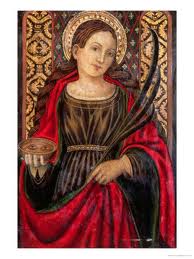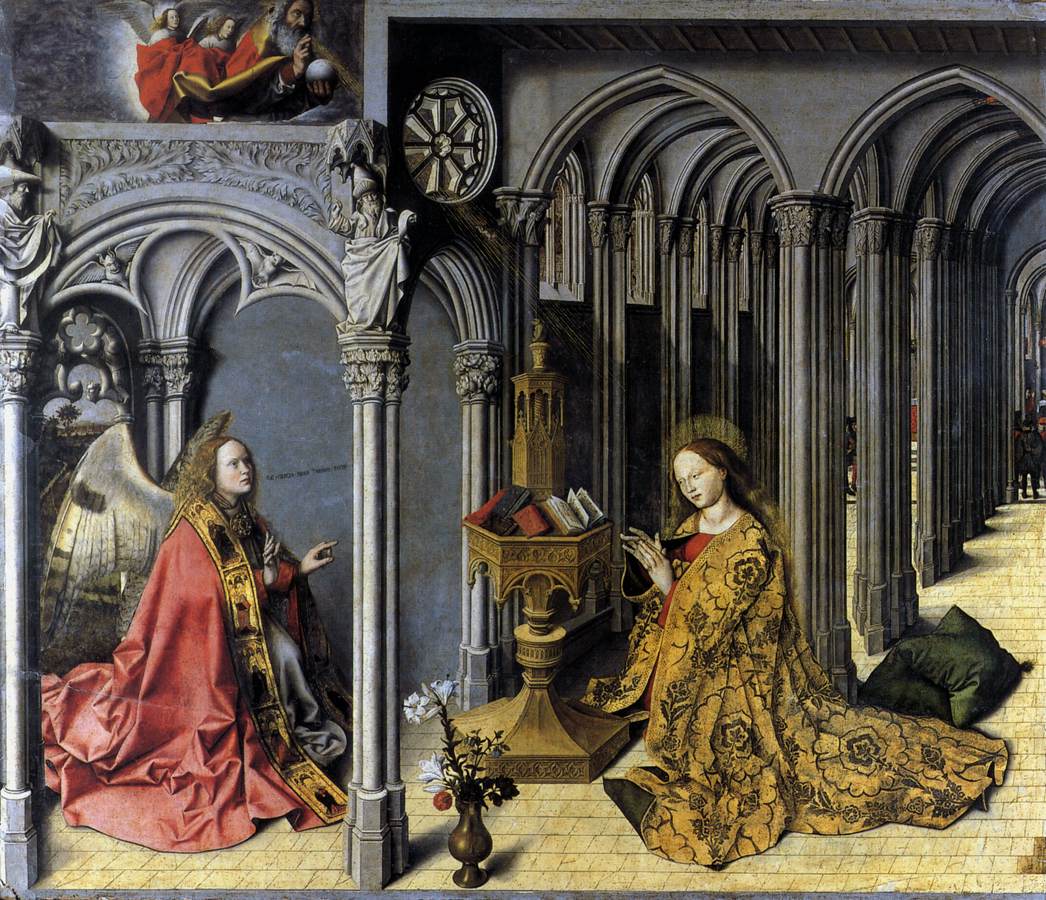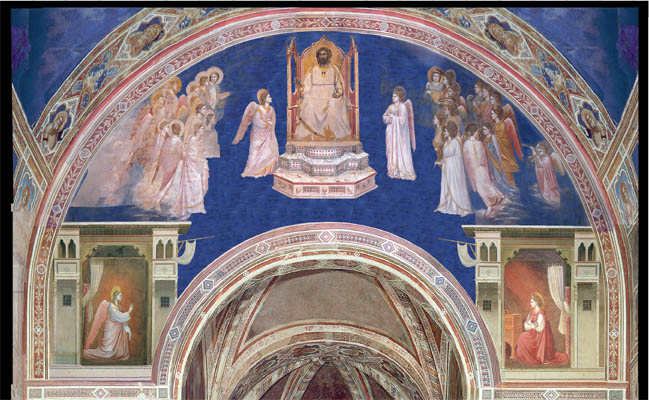
Do you remember the little mnemonic poem: “Lenty, Penty, Crucy, Lucy”? Or else
“Fasting days and Emberings be
Lent, Whitsun, Holyrood, and Lucie.”
The Wednesday, Friday and Saturday after the Feast of St. Lucy are the Advent Ember Days.
In the old, Julian calendar (before it was reformed and adjusted by Gregory XIII) 13 December was the shortest, darkest day of the year. The feast of St. Lucy, whose name from the Latin lux, for “light”, was very important in yesteryear. It reminded our forebearts, and us in unity with them in the still darkening northern hemisphere, that our days – which are numbered – will soon be getting longer again.
Lucy will usually be depicted in art with a lantern, or with a crown of candles, or – most commonly – with her own eyes on a platter.
Some accounts have Lucy slain by having her throat thrust through with sword. Other accounts say that to protect her virginity she disfigured herself by cutting her own eyes out and sending them to her suitor, a plot likely to discourage him. St. Lucy is therefore the patroness of sight.
St. Lucy shows up fairly often in Dante’s great Divine Comedy. She is first in the Inferno. It is Lucy who asked Beatrice to help Dante. In Purgatory the eagle that bears Dante upward in a dream is actually Lucy who is bearing him to the gate of Purgatory. Eagles, of course, are “eagle-eyed” and see very well. In the Paradiso she is placed directly across from Adam in the Heaven of the Rose. Lucy can gaze directly at God.
It seems that St. Lucy was something of a patroness for Dante and that he was devoted to her because, as we glean from various works, he may have had a problem not just with his eyes but also struggling with sins of the eyes.
This week we have the Ember Days, which in Advent come after the Feast of St. Lucy.
Today is Ember Wednesday in Advent. Hence, today is the day of the so-called Missa aurea, or “Golden Mass”.

There is a strong Marian overtone to today’s Mass formulary. The Roman Station for today is St. Mary Major. The Gospel is the Annunciation.
The illuminated missals and sacramentaries of centuries past presented the Gospel or at least its initial capital letters in gold, whence our nickname Missa aurea.
And the Gospel pericope begins Missus est angelus Gabriel…. It was once celebrated with a solemnity nearly approaching a feast day.
Missa aurea also refers to little dramas in medieval times in which the Annunciation was acted out. It is thus not just “golden Mass” but “the golden sending“, which of course refers to the moment in which Our Lord becomes incarnate in the womb of the Virgin and His work for our salvation begins a new phase.
Missa aurea comes to be used in the terminology of art history also for paintings of the Annunciation, which often contain dramatic elements associated with the tableaux struck in the dramatic presentations of the mystery. Doves would be lowered and an old man would be placed in a loft wearing an alb and cope. Angels would come vested in dalmatics.
Here’s a photo of the 13th c. Scrovegni Chapel. Giotto’s frescoes echo this tradition as do many paintings of the Annunciation.

And, since today is an Ember Day, we who recite the Office according to the Roman Breviary must during Lauds also say the Weekday Intercessions, which don’t come up on all weekdays.
Weekday Intercessions
Lord, have mercy upon us. Christ, have mercy upon us. Lord, have mercy upon us.
Our Father, who art in heaven, Hallowed be thy name. Thy kingdom come. Thy will be done on earth as it is in heaven. Give us this day our daily bread. And forgive us our trespasses, as we forgive those who trespass against us.
℣. And lead us not into temptation:
℟. But deliver us from evil.
℣. I said: Lord, be merciful unto me:
℟. Heal my soul, for I have sinned against thee.
℣. Turn thee again, O Lord; how long will it be?
℟. And be gracious unto thy servants.
℣. Let thy mercy, O Lord, be upon us.
℟. As we have hoped in thee.
℣. Let thy priests be clothed with justice:
℟. And may thy saints rejoice.
℣. Let us pray for our most blessed Pope N.
℟. The Lord preserve him and give him life, and make him blessed upon the earth: and deliver him not up to the will of his enemies.
℣. Let us pray for our bishop N.
℟. May he stand firm and care for us in the strength of the Lord, in the might of thy name.
In Rome, the preceding Versicle and its Response are omitted. Elsewhere, the name of the local Ordinary is inserted at the letter N. If the Holy See or the See of the local Bishop is vacant, the appropriate ℣. and ℟., either or both as the case may be, is omitted.
℣. O Lord, save our leaders.
℟. And mercifully hear us when we call upon thee.
℣. O Lord, save thy people, and bless thine inheritance:
℟. Govern them and lift them up for ever
℣. Remember thy congregation,
℟. Which thou hast possessed from the beginning.
℣. Let peace be in thy strength.
℟. And abundance in thy towers.
℣. Let us pray for our benefactors.
℟. O Lord, for thy name’s sake, deign to reward with eternal life all who do us good. Amen.
℣. Let us pray for the faithful departed.
℟. Eternal rest grant unto them, O Lord, and let perpetual light shine upon them.
℣. May they rest in peace.
℟. Amen.
℣. Let us pray for our absent brothers.
℟. Save thy servants, O God, who put their trust in thee.
℣. Let us pray for the afflicted and imprisoned.
℟. Deliver them, God of Israel, from all their tribulations.
℣. O Lord, send them help from thy sanctuary.
℟. And defend them out of Sion.
℣. Turn us again, O Lord, God of Hosts.
℟. Show us thy face, and we shall be whole.
℣. Arise, O Christ, and help us.
℟. And redeem us for thy name’s sake.
℣. O Lord, hear my prayer.
℟. And let my cry come unto thee.
Prayer {from the Proper of the season}
skip second ‘O Lord, hear my prayer’
Let us pray.
Grant, we beseech thee, Almighty God, that the solemn Feast of our redemption, which is now at hand, may both help us in the life which now is, and further us toward the attaining of thine eternal joy in that which is to come.
Through Jesus Christ, thy Son our Lord, Who liveth and reigneth with thee, in the unity of the Holy Ghost, ever one God, world without end.
℟. Amen.
Where is all this in the Novus Ordo?
(Trick question.)


































beautiful
Of course, the Preces were said on all ferial days of Advent and Lent prior to 1962, which is to say, they were rarely said. Go figure that the 1962 scheme is the only one which correctly prioritizes those seasons, but that the Preces are reduced to Wednesday, Friday, and Ember Saturday.